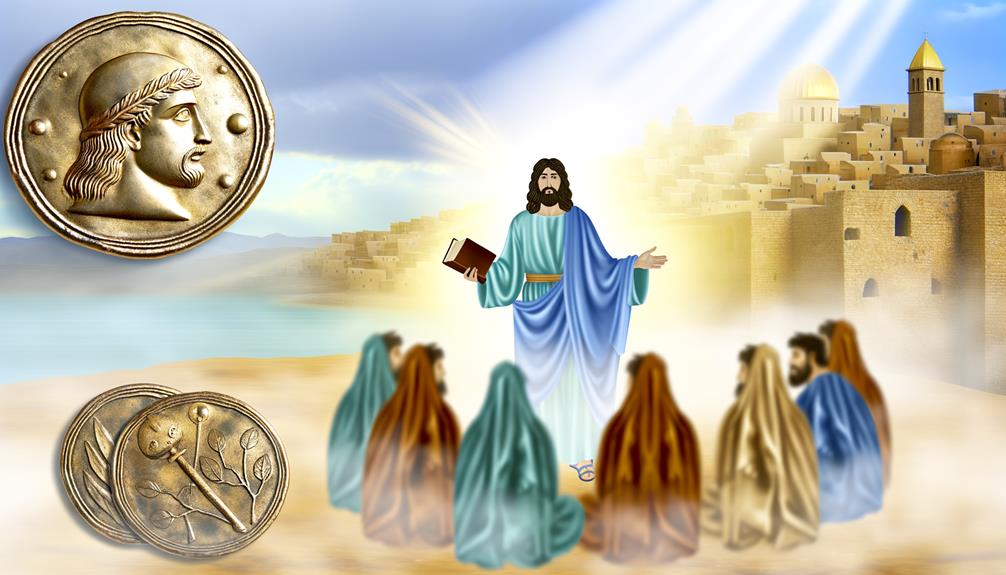Give Caesar What Belongs to Caesar Bible Verse Meaning
In the context of Roman-occupied Judea, Jesus’ instruction to “Give Caesar what belongs to Caesar” (Matthew 22:21) addresses the delicate balance between earthly and divine authorities. Historically, it depicts the socio-political tension of paying taxes to Roman rulers, a point of contention for the Jewish populace.
Theologically, the statement transcends mere civic obligation, asserting God’s sovereignty while recognizing secular governance. Through this profound teaching, Jesus navigates the political trap set by the Pharisees and Herodians, while emphasizing dual allegiance to civic duties and spiritual devotion, providing substantial insight into the harmonious coexistence of faith and societal responsibilities.

Give Caesar What Belongs to Caesar Bible Verse: Meaning and Biblical Insights
| Aspect | Details |
|---|---|
| Verse Text | Matthew 22:21: “Jesus said, ‘Give back to Caesar what is Caesar’s, and to God what is God’s.’” |
| Biblical Context | Jesus’ response to a question about paying taxes, posed by the Pharisees and Herodians to trap Him. |
| Key Themes | Authority, responsibility, dual obligations to earthly governments and God, and wisdom in conflict. |
| Symbolism | “Caesar” symbolizes earthly authority, while “God” represents divine sovereignty. |
| Spiritual Insights | Teaches balance between fulfilling worldly responsibilities and maintaining spiritual devotion. |
| Practical Application | Encourages respect for civil authority while prioritizing God’s commands and eternal values. |
| Modern Relevance | Offers guidance on navigating conflicts between faith and societal expectations. |
Historical Context

The phrase ‘Give Caesar what belongs to Caesar’ originates from a pivotal moment recorded in the Synoptic Gospels, where Jesus navigates a politically charged question about paying taxes to the Roman authorities.
This exchange took place in a context where Judea was a Roman province, under significant political and social strain. The Jewish population was subjected to Roman rule, which included the imposition of taxes that were deeply resented.
The Pharisees and Herodians, groups with contrasting political and religious views, sought to entrap Jesus by His response. If Jesus advocated tax payment, He risked alienating nationalistic Jews; opposing it would be seen as sedition against Rome.
Jesus’ profound answer transcended political entrapment, emphasizing a dual responsibility to both civic and divine obligations.
Biblical Passage Analysis

Examining the biblical passage where Jesus utters ‘Give Caesar what belongs to Caesar,’ one must explore the layers of theological significance, historical context, and exegetical nuances to fully grasp its profound implications. This statement, found in Matthew 22:21, is not merely a directive on civic duty but a profound theological assertion. Jesus addresses the tension between secular authority and divine sovereignty, emphasizing the importance of recognizing both domains. The passage’s historical setting involves the Pharisees and Herodians attempting to entrap Jesus with a politically charged question about taxation. In this encounter, Jesus skillfully navigates the dilemma, highlighting that while earthly governance holds its rightful place, it cannot overshadow the ultimate authority of God. This dualism underscores the role of Christians in engaging with civil matters while remaining anchored in their faith, as they recognize Christ as Savior in Scripture. Ultimately, this statement challenges believers to consider how they participate in society without compromising their allegiance to divine principles.
| Aspect | Explanation |
|---|---|
| Theological Significance | Differentiates between earthly and divine obligations |
| Historical Context | Set against the backdrop of Roman occupation and Jewish resistance |
| Audience | Pharisees and Herodians, representing religious and political authorities |
| Key Phrase | ‘Render unto Caesar’ – a call to fulfill civic responsibilities |
| Exegetical Nuance | Implicit recognition of God’s ultimate authority over all earthly powers |
This verse invites a deeper reflection on the interplay between faith and societal duties.
Theological Interpretations

Theological interpretations of the directive to ‘Give Caesar what belongs to Caesar’ necessitate an examination of its historical context, particularly the socio-political climate of Roman-occupied Judea.
Ethical implications arise as scholars ponder the balance between civic duty and spiritual allegiance, challenging believers to reflect on the boundaries of their obedience to secular authority.
In addition, this passage invites modern-day applications, prompting contemporary discussions on the intersection of faith and governance in a pluralistic society.
Historical Context Analysis
Delving into the historical and theological backdrop of Jesus’ statement, ‘Give Caesar what belongs to Caesar,’ reveals a complex interplay between Roman political authority and Jewish religious identity. This pronouncement occurred in a context where Roman occupation had imposed heavy taxes on the Jewish populace, creating tensions.
Roman Authority: The empire’s pervasive control over Judea necessitated a nuanced response to questions of loyalty and taxation.
Taxation: The denarius coin, bearing Caesar’s image, symbolized Roman economic dominance.
Jewish Law: Religious leaders grappled with adherence to Torah while under foreign rule.
Messianic Expectations: Many Jews anticipated a Messiah who would liberate them from Roman oppression.
Political Trap: Jesus’ response skillfully evaded the trap set by Pharisees and Herodians, who sought to incriminate Him.
Ethical Implications Explored
Jesus’ directive to ‘give Caesar what belongs to Caesar’ invites a profound reflection on the intersection of civic duty and religious devotion, challenging believers to discern their responsibilities within both secular and sacred domains.
Theologically, this statement underscores a dual allegiance: to earthly authorities, symbolized by Caesar, and to the divine, represented by God.
Historically, Jesus navigates the complex socio-political landscape of Roman-occupied Judea, where Jewish identity and Roman rule often clashed.
Exegetically, His response to the Pharisees reveals a nuanced understanding of God’s sovereignty over all domains, without dismissing the legitimacy of temporal governance.
Consequently, believers are called to fulfill their civic duties while maintaining ultimate allegiance to divine principles, embodying a balance of faith and societal engagement.
Modern-Day Applications
Building on the ethical implications of Jesus’ directive, contemporary theological interpretations seek to apply this principle within the complexities of modern-day governance and individual faith practices.
Exegetical analysis highlights that believers must navigate their dual responsibilities to both divine and earthly authorities. This nuanced approach invites reflection on how to balance civic duties with spiritual commitments.
- Taxation: Ethical participation in equitable tax systems.
- Civic Engagement: Voting and advocacy consistent with faith values.
- Justice: Supporting laws that promote social justice and humanitarian concerns.
- Corporate Responsibility: Ethical business practices reflecting Christian principles.
Such applications emphasize a harmonious integration of divine commands with societal obligations, promoting a faithful yet engaged presence in the world.
Political Implications

The phrase ‘Give Caesar what belongs to Caesar’ has profound political implications, as it delineates the boundaries between secular authority and religious obligation within a historical and theological context.
This statement, attributed to Jesus in the Gospels, was delivered in response to a politically charged question about paying taxes to the Roman Empire.
By acknowledging Caesar’s coin bearing his image, Jesus implicitly endorses the legitimacy of earthly governance while simultaneously asserting the supremacy of divine authority.
Exegetically, this verse articulates a dual responsibility: citizens must fulfill their civic duties without compromising their allegiance to God.
Historically, this demarcation helped early Christians navigate the complexities of loyalty to both the Roman state and their burgeoning faith community.
Spiritual Lessons

While the political implications of ‘Give Caesar what belongs to Caesar’ are significant, the spiritual lessons embedded within this teaching offer profound insights into the balance between earthly duties and divine devotion.
This statement by Jesus encapsulates the dual responsibilities Christians hold: fulfilling obligations to governing authorities while prioritizing allegiance to God. Theologically, this verse underscores the importance of discernment in separating secular and sacred commitments.
- Recognition of God’s supreme authority: Beyond earthly rulers, God’s dominion is paramount.
- Integration of faith and daily life: Faith should permeate all aspects of existence.
- Stewardship of resources: Use material blessings responsibly for divine purposes.
- Spiritual discernment: Identify and fulfill both civic and spiritual duties.
This duality enriches our understanding of living faithfully in a complex world.
Modern-Day Relevance

In contemporary society, the exhortation to ‘give Caesar what belongs to Caesar’ continues to resonate, particularly in discussions surrounding financial obligations such as taxes, civic responsibilities like voting and jury duty, and the complex landscape of ethical decision-making.
This scriptural directive, deeply rooted in its historical and cultural context, challenges modern readers to balance allegiance to governmental authorities with their higher moral and spiritual commitments.
Financial Obligations Today
Maneuvering the intersection of faith and finances, modern believers are called to balance their spiritual convictions with legal and societal obligations, much like the early Christians who grappled with the implications of Jesus’ directive to ‘give Caesar what belongs to Caesar.’
This biblical principle offers a framework for addressing contemporary financial responsibilities. It underscores the importance of honoring both divine and governmental decrees.
- Taxation: Compliance with tax laws as a civic duty.
- Charitable Giving: Reflecting God’s generosity in financial stewardship.
- Debt Management: Upholding integrity by fulfilling financial commitments.
- Ethical Investment: Aligning financial practices with moral and ethical values.
In essence, this scriptural mandate encourages believers to navigate financial obligations with integrity and faithfulness.
Civic Responsibilities
The call to fulfill civic responsibilities resonates deeply within the Christian tradition, urging believers to engage actively in societal duties as an expression of their faith and commitment to the common good.
Historically, this mandate is rooted in Jesus’ exhortation to ‘render unto Caesar,’ emphasizing the importance of respecting governmental authority.
Exegetically, this directive underscores a dual obligation: honoring divine commandments while contributing to societal order.
Theologically, it reflects the notion that civic participation—such as voting, community service, and advocacy—embodies the Christian vocation to love one’s neighbor.
Therefore, modern-day relevance is found in the believer’s active role in fostering justice, peace, and communal welfare, aligning earthly responsibilities with heavenly principles.
Ethical Decision-Making
Guiding ethical decision-making in a contemporary context necessitates a profound integration of scriptural wisdom, historical insights, and theological principles to address the multifaceted challenges facing believers today. The directive to “Give Caesar what belongs to Caesar” (Matthew 22:21) underlines the necessity of distinguishing between secular and divine obligations.
Scriptural Wisdom: Engaging with biblical texts to discern moral imperatives.
Historical Insights: Understanding the socio-political context of biblical teachings.
Theological Principles: Applying doctrinal teachings to contemporary issues.
Moral Integrity: Upholding truth and justice in personal and communal decisions.
Community Engagement: Balancing individual ethics with societal responsibilities.
In this way, believers can navigate modern ethical dilemmas with a balanced, informed, and faithful approach.
Scholarly Perspectives

In the domain of theological scholarship, the phrase ‘Give Caesar what belongs to Caesar’ has been the subject of extensive exegetical analysis, with scholars delving into its historical context and theological implications.
This statement, attributed to Jesus in the Synoptic Gospels, has led to varied interpretations regarding the delineation of secular and divine authority. Scholars often contextualize this verse within the socio-political milieu of first-century Judea, highlighting the tension between Roman imperialism and Jewish religious identity.
Theologically, the phrase is seen as a nuanced directive that underscores the legitimacy of earthly governance while affirming the preeminence of divine sovereignty. Such scholarly perspectives enrich our understanding of how early Christians navigated their dual allegiances to God and state.
Conclusion
The exhortation to ‘give Caesar what belongs to Caesar’ serves as a multifaceted directive encompassing historical, theological, and political dimensions.
Like a finely crafted mosaic, each piece contributes to a larger, more profound understanding.
For instance, the Roman denarius, bearing Caesar’s image, symbolizes the temporal authority acknowledged by Jesus, yet juxtaposed with the divine sovereignty over spiritual matters.
This distinction invites continuous reflection on the balance between earthly duties and spiritual allegiance, remaining ever-relevant across epochs.






